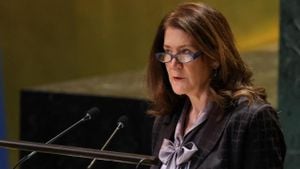Allegations surrounding Tomasz J., whose connections with Polish politician Iwona Arent have thrown the nation’s political integrity under scrutiny, have surfaced as one of the most serious corruption scandals faced by Poland's ruling party, Law and Justice (PiS). Recent revelations provide insight on how J. infiltrated high-ranking political circles, raising urgent questions about transparency and the future of anti-corruption measures within the government.
Initially operating largely under the radar, Tomasz J.'s unexpected rise to power was significantly facilitated by his personal relationship with Iwona Arent, who serves as the chair of the Polish-Lithuanian Parliamentary Group and has been a member of the Sejm since 2006. Their relationship reportedly began during the summer of 2019 and blossomed during various official visits. Reports indicate J. participated alongside Arent during her legislative activities, including hands-on involvement at events such as one at the St. John Bosco High School in Lithuania.
While Arent has publicly denied any inappropriate conduct, asserting their relationship was strictly professional, the nature of their close interactions has raised eyebrows. According to testimonies, Tomasz J. had such familiarity with the inner workings of Polish politics and business circles, he was once heard saying, "Prezes już był tak blisko mnie... no to oczywiście wykorzystałem sytuację, nie?" This indicated his calculated approach to networking, leveraging his relationships for personal gain.
Following allegations of fraudulent practices, investigations by the Central Bureau of Anticorruption (CBA) commenced, focusing on J’s dealings with state-owned companies like Orlen and Tauron. Reports confirmed he frequented these corporate offices, enhancing his reputation as a lobbyist with direct connections to influential executives, including Orlen’s CEO Daniel Obajtek. The CBA's operation against J. was even codenamed "Casanova," highlighting the intertwining of his professional ambitions with his personal liaisons.
Many gathered around J. during his rise to influence were not only business associates but lawmakers and government officials as well. J. was known to have mingled with politicians, even attending social events hosted by Father Rydzyk, meeting influential figures like Jarosław Kaczyński. Witnesses claim J. had access similar to one of their own, solidifying the idea he was more than just another businessperson trying to make it within the system.
Yet, as the investigation progressed, concerns over J.'s questionable qualifications came to light, including his alleged impersonation of various roles within state agencies and fabrications about his background. His lack of formal education and attempts to falsify academic credentials only intensified scrutiny on both him and the figures connected to him. These revelations reflected poorly not just on J., but also on any politicians linked to him, prompting Arent to take drastic action by suspending her political activities following the scandals.
Bringing political pressure to bear, the allegations have raised alarm bells among the public about the transparency and ethics of their leaders. Although Tomasz J. remained adamant about his innocence, stating he had ''merely been enjoying good company,” the fallout from these scandals suggests otherwise.
With the trial now underway, featuring potential witnesses spanning numerous high-profile politicians and former ministers, the ramifications of this case could lead to sweeping reforms aimed at increasing accountability and trustworthiness within Polish government structures. Many observers are awaiting the outcomes of these proceedings, recognizing they bear the potential to alter the political climate as allegations of betrayal and misuse of power continue to shape public discourse.
These events have reignited discussions about the imperative for rigorously enforcing anti-corruption measures and ensuring higher ethical standards for politicians. The scandal serves as both cautionary tale and rallying cry for greater accountability, especially as public confidence wanes.
With Tomasz J. facing serious charges of corruption, lobbying without registration, and money laundering, it remains to be seen how both the justice system and political establishment will respond to restore faith among Polish citizens. The repercussions of this scandal could reshape not only individual careers but also the frameworks governing political conduct and integrity across the country.



